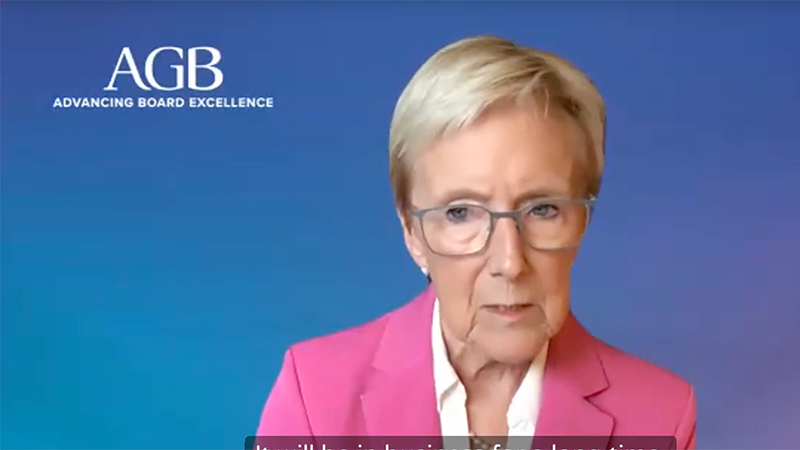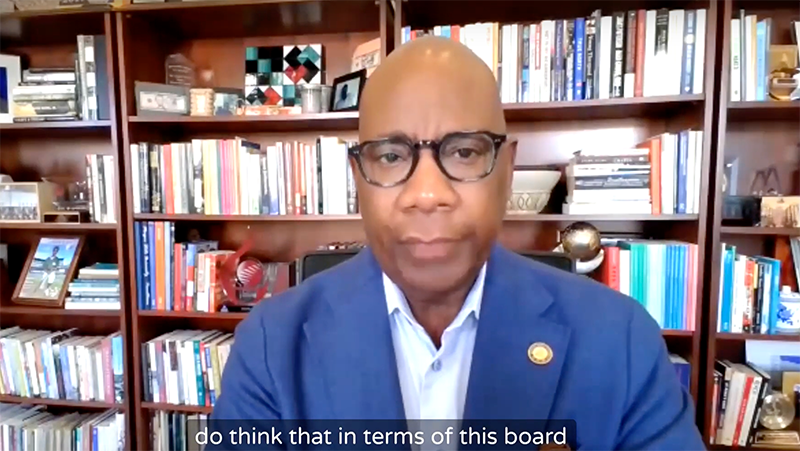
Opinions expressed in AGB blogs are those of the authors and not necessarily those of the institutions that employ them or of AGB.
In November, AGB concluded its webinar series on the Top Strategic Issues for Boards 2024-2025 report. The webinar focused on several themes highlighted in the report, including board independence and leadership.
Higher education governing boards have fiduciary duties mandating them to always act in the best interests of their institutions. Board members must realize that internal and external constituencies might challenge their ability to fulfill these fiduciary responsibilities, but boards nevertheless have a responsibility to protect institutional autonomy and their organization’s mission. To achieve this, effective boards must be collaborative, develop supportive relationships with campus leaders, and understand their organization’s mission.
Below are some of our recommendations for higher education governing boards, along with some excerpts from the webinar.
Fiduciary Duties of Higher Education Governing Boards
An effective higher education governing board operates independently, rejecting outside influences which might attempt to undermine the mission of its institution, system, or foundation. This independence is inherent in the board’s fiduciary duties of care, loyalty, and obedience.
AGB senior consultant and senior fellow Ellen Chaffee explained that the duty of care means that a board should be advancing the institution’s ability to fulfill its mission. Meanwhile, the duty of loyalty requires board members to consider the good of the institution, system, or foundation, rather than their own interests, in performing their duties. Boards must prevent their own conflicts of interest and not allow the interests of others without fiduciary responsibilities to sway their decisions. Finally, the duty of obedience requires higher education governing boards to ensure that their institution is doing what it promises to do, what it is chartered and legally obliged to do, and acts in a manner that is obedient to the law and takes into account such critical factors as accreditation requirements. Boards need to know and understand where their authority could be challenged, how they can exercise their legal authority, and what is required to protect institutional autonomy to fulfill their mission, Chaffee added.
Building Relationships
Higher education boards have a fiduciary responsibility to protect their organizations from outside influence which might undermine their institutions’ missions. To meet their fiduciary obligations, board members need to develop relationships with campus leaders that allow them to arrive at common understandings of the institution’s mission and the roles of the board, administration, and faculty in achieving that mission. When boards have strong relationships with campus leaders that are built on respect, trust, and mutual understanding, they are better prepared to fulfill their mission and respond to crises.
David Maxwell, an AGB senior consultant and senior fellow, trustee of Grinnell College, and president emeritus of Drake University, noted that boards should begin by building a relationship of trust and mutual support with the chief executive. The board needs to trust the president’s judgment and expertise, and the president needs to trust the board’s collective wisdom and commitment to common goals. It is critical that board members have a thorough orientation to fully understand how higher education boards operate and what the respective roles are of the board, the administration, and the faculty. Board members can also use periodic reminders of critical issues, such as where the institution is going, what their roles are in getting it there, and with whom they need to develop a collective agreement on institutional goals and plans to achieve that future.
Kristin Hultquist, chair of the Board of Trustees at Metropolitan State University of Denver and CEO and founding partner of HCM Strategists, LLC, agreed that boards should lean in with curiosity and respect for plans that the administration and faculty already have underway. Board members need to learn their organization’s strategic plan and understand their fiduciary role in terms of oversight of that plan before digging in and asking questions. When board members build personal relationships with each other and important stakeholders, it helps the board stay well-aligned and independent.
David K. Wilson, president of Morgan State University and a director on the AGB Board of Directors, added that a board’s relationship with a president requires hard work up front by the president and each member of the governing board, especially the chair, to get to know one another. These conversations should answer questions like, “What are your values? What do you care about?” Establishing that kind of relationship leads to trust when boards and presidents need to make tough decisions.
Putting Principles into Practice
The panel presented a hypothetical scenario in which a major donor threatens to stop giving to an institution unless administrators shut down a speaker series on a controversial topic.
Ideally, a board is a partner with the chief executive in working through the crisis. Maxwell said that the board must be prepared to publicly stand behind the chief executive, and he offered some questions for boards to consider in this scenario, including:
- How can we help? What do you need from us?
- What decisions should be the board’s responsibility and what decisions should be the chief executive’s?
- Has there been any attempt to help this donor understand the importance of the series?
- Has there been any attempt to help this donor understand that this kind of interference in the business of the institution simply is not the behavior of someone who cares for the institution and who believes in its mission?
- Is it likely that this series is going to be controversial publicly? If so, what measures have been taken to ensure the safety of all participants and that the series is not disrupted, while also ensuring that there are appropriate opportunities for opposing voices to be heard?
Maxwell urged boards and campus leaders to build a portfolio of possible crisis scenarios and clearly identify their responses before a crisis. He also recommended that boards perform regular self-assessments, which is also an accreditation requirement, because any high-performing organization periodically needs to step back and ask, “Are we doing the right things in the right way at the highest possible level?”
Conclusion
The fiduciary duties of care, loyalty, and obedience require higher education board members to act in the best interests of their organization’s mission. Boards should build strong relationships with campus leaders and understand the different stakeholders’ roles and responsibilities in achieving their institutional goals. When boards establish a relationship of respect and trust with the chief executive, understand how the activities on their campuses support the mission, and engage in thoughtful planning and self-assessment, they are better prepared to meet their fiduciary responsibilities to protect their institutions, systems, and foundations from external influences that might undermine their missions.
Ellen Chaffee is a senior consultant and senior fellow at AGB.
Kristin Hultquist is chair of the Board of Trustees at Metropolitan State University of Denver and CEO and founding partner of HCM Strategists, LLC.
David Maxwell is a senior consultant and senior fellow at AGB, trustee of Grinnell College, and president emeritus of Drake University.
David K. Wilson is president of Morgan State University and a director on the AGB Board of Directors.
RELATED RESOURCES

Reports and Statements
AGB Board of Directors’ Statement on the Fiduciary Duties of Governing Board Members








